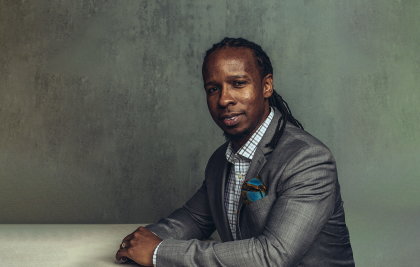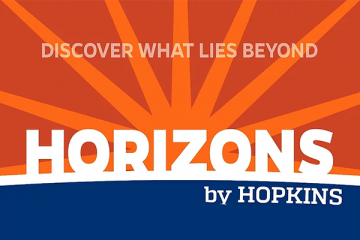Universities can help dismantle racist systems, or they can reinforce them, said historian and author Ibram X. Kendi during a wide-ranging conversation Dec. 3 at Johns Hopkins University. The key to being an engine for good, he said, is to abandon the notion that universities are saviors of society and instead acknowledge and repair past harms.
"If the heartbeat of being racist is denial, then the heartbeat of being antiracist is acknowledgment, is recognition, is admission," he said. "That then leads to reconciliation and remedies. … But that treatment can only come after we end our denial."
Kendi, the international bestselling author of How to Be an Antiracist, which The New York Times called "the most courageous book to date on the problem of race in the Western mind," spoke as part of the Horizons by Hopkins conference organized by PHutures, a branch of the Office of Integrative Learning and Life Design that serves doctoral students and postdoctoral fellows. Planned by a committee of PhD students and postdoctoral fellows, the conference featured career workshops, networking opportunities, and keynote addresses focusing on identity and discrimination and equity in higher education. Sessions were hosted by expert facilitators who considered not only approaches to rendering higher ed spaces more inclusive, but provided strategies for participants to transition from education to career.

Image credit: Stephan Voss
"Students have become increasingly engaged in social impact and racial justice and are looking for careers and organizations that align with their values and goals," said Roshni Rao, director of PHutures. "From hiring processes to representation and inclusion at work, there is a strong call to action to create equitable and anti-discriminatory work cultures. Through conversations at this conference, we wanted to address very transparently how we can reimagine our entrenched ways of thinking within academia and how that knowledge and practice might embolden our students on their job search, especially as they venture out into their communities and become world leaders."
At the heart of Kendi's scholarship is the idea of antiracism, which postulates that active and sustained effort is required to dismantle racism. It is not enough for a person to not be racist—rather, deliberate actions must be taken in order to undo the mechanisms of discrimination in modern society, which include laws, policies, and systems, as well as individual thoughts, words, and actions.
At universities, and especially those with research missions, it is essential that scholars uphold antiracist ideals in their research, Kendi said.
"When the researcher recognizes at a basic level that the problem is structures, they can go into communities and ask the people, 'What is harming you?'" he said. "That's the job of the researcher—to collate that information and systematize it, and then clarify it for those very people, as well as the world. But part of that process is respecting the people who are closest to that harm by involving them in the research process."
Kendi said it is also vital for scholars to heed what research on discrimination has shown—that children as young as 3 have an adult-like conception of race and can recognize and adopt different attitudes about race.
"And so if we are not ensuring that they're connecting darker skin to lighter skin complexions as equals, as part of a human rainbow … what are they going to be taught by our society?" Kendi said.
Kendi's talk was sponsored by the Office of Diversity and Inclusion and moderated by Keshia Pollack Porter, vice dean for faculty at the Johns Hopkins Bloomberg School of Public Health and a health equity researcher. It was followed by a keynote address on identity by Amber Hikes, chief equity and inclusion officer for the American Civil Liberties Union.
Image caption: Amber Hikes, chief equity and inclusion officer for the American Civil Liberties Union, speaks at the Horizons by Hopkins conference.
During the conference, PHutures unveiled the new Career Impact Award, which recognizes faculty members, students, postdoctoral fellows, and alumni who have shown outstanding efforts in the areas of mentorship, support for academic and intellectual goals and interests, encouragement of professional exploration, and creating an environment of inclusion.
The winners of the 2021 Career Impact Award are:
- Teresa Brockie, assistant professor at the School of Nursing
- Thomas Kempa, assistant professor in the Department of Chemistry
- Simon Leonard, assistant research professor in the Department of Computer Science
- W. Taylor Cottle, PhD student in the Department of Biophysics and Biophysical Chemistry
- Gian Molina-Castro, PhD student in the Department of Neuroscience
- Varshini Varadaraj, postdoctoral research fellow at the Wilmer Eye Institute
- Kelly Clark, associate director of the Center for Educational Resources, Teaching Academy
- Renee Eastwood, director for graduate academic affairs at the Krieger School of Arts and Sciences
- Dana Ferraris, chair of the Department of Chemistry at McDaniel College and two-time JHU alum
- Erin Guinn-Villareal, analyst for the U.S. Government Accountability Office and two-time JHU alum









